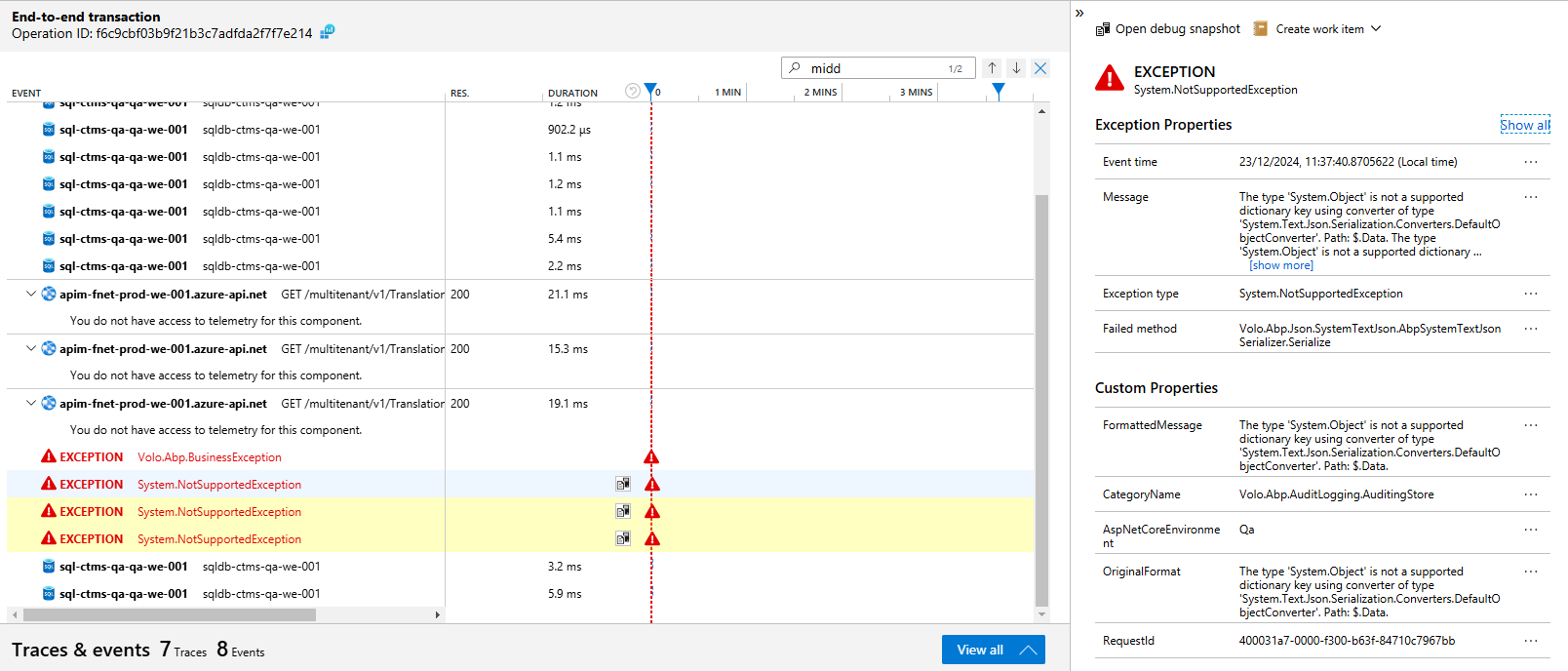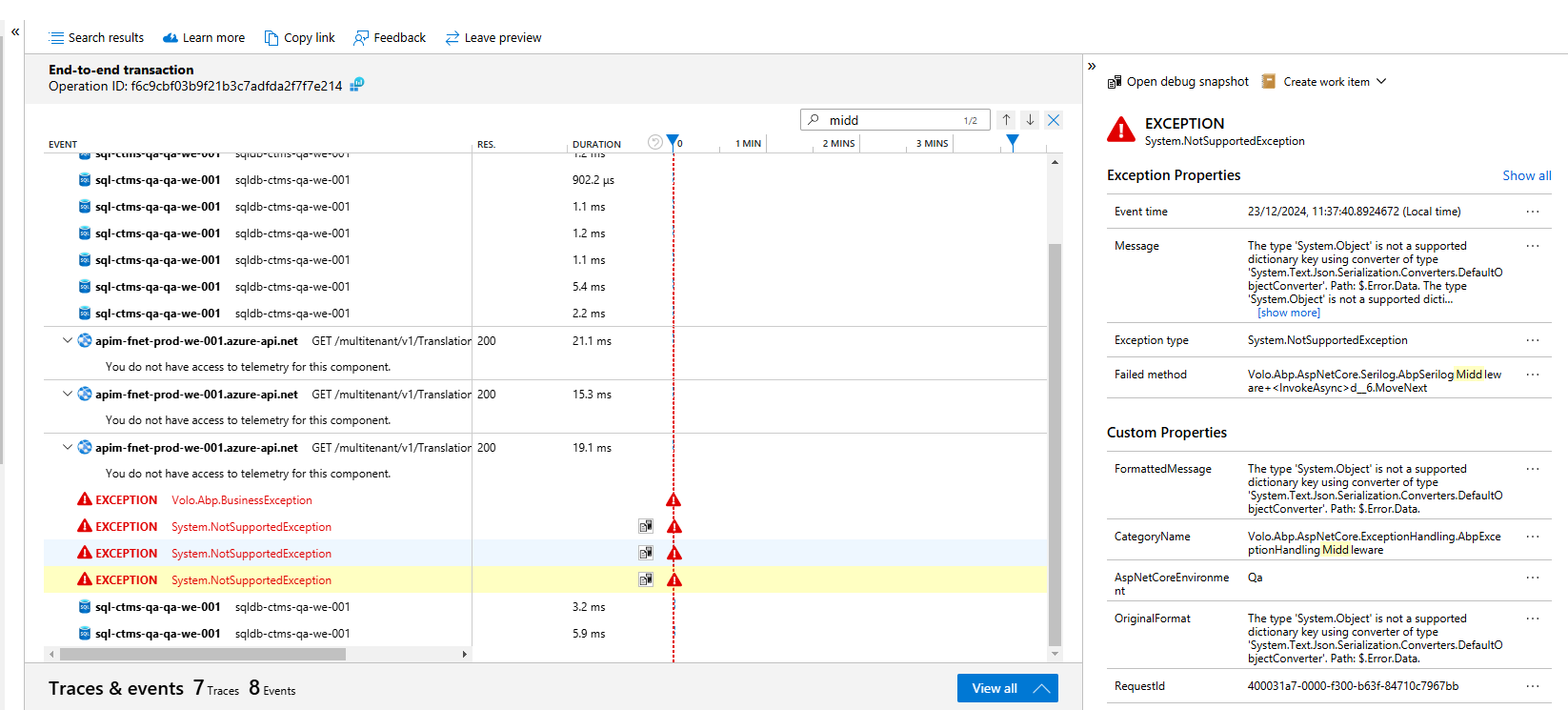Hi,
My bad, the name convention needed the word Async at the end of function names to work.
Thanks for the support
Hi,
I'm having issues generating the static clients using the ABP CLI command.
I have the following AppService interface with its implementation, as well as a base AppService.

Base appservice and methods:
Here is the structure of the DTOs, filters:
This is what the CLI generates with the following command: abp generate-proxy -t csharp -u https://localhost:44393/ --without-contracts
Finally, I'm adding the app-generate-proxy.json file:
And HttpApi.Client references:

Thank you.
We are experiencing issues with Blazor WASM initialization due to the loading of modules.
We considered using InteractiveAuto rendering to speed up the initial load of the login page when the user is not authenticated, but this is not an option since our component suite is designed to work with WASM.
We have explored alternatives, such as having two WASM projects referenced from the same Blazor WebApp project (Blazor, Blazor.Client, Blazor.Login), as demonstrated here: https://github.com/jirisykora83/WebAppMultiBlazor
We want to apply this same approach using ABP, with the idea that the additional Blazor.Login project would handle authentication. This project would only include authentication dependencies and the login page to streamline the initial entry into the application.
In other words, when the user is not authenticated, they should be redirected to the login page of the Blazor.Login project. If authenticated, they should be redirected to the Blazor.Client project, which contains all application dependencies and represents the main application.
Would this be possible with ABP? What logic would need to be overridden to achieve this approach?
Thank you very much!
It works correctly, but if I load the application on a page that injects an IApplicationService, when the render mode is Server, it says that it is not registered.
However, if I enter the application through the dashboard and, once the WASM is downloaded, I navigate to the page that has the IAppService, then in Client render mode, it works fine and correctly resolves the dependency injection.
Hello, I created a solution using the command:
abp new Acme.BookStore -u blazor-webapp -m none --theme leptonx -csf
After making changes to BookStoreHttpApiClientModule to use static clients, I ran the command to generate the clients, but I got the following error in the CLI (as shown in the image).
Hello,
I am experiencing severe startup delays in the WASM application once the WASM assemblies are loaded in the browser.
One of the options we are considering with my colleagues to improve the startup performance of the application after downloading the WASM file is to avoid generating proxies at runtime. Since reflection is costly in WebAssembly, this would save computation time and potentially eliminate the request to the api-definition endpoint, which also introduces a delay.
Would it be possible to generate these proxies at compile time instead?
In a Blazor solution, would this be complex or resource-intensive? Is there any command available in the ABP suite to achieve this?
What would be the recommended steps to follow to enable this feature?
Thank you for your support.
Hello, I am trying to replace Serilog with ApplicationInsightsTelemetry in the Host project for the purpose of logging traces, exceptions and exception messages in azure application insights. Like this: `
var applicationInsightsConnectionString = builder.Configuration["ApplicationInsights:ConnectionString"];
if (!string.IsNullOrEmpty(applicationInsightsConnectionString))
{
builder.Services.AddApplicationInsightsTelemetry(options =>
{
options.ConnectionString = applicationInsightsConnectionString;
});
}
else
{
Log.Logger = new LoggerConfiguration()
.MinimumLevel.Override("Microsoft", LogEventLevel.Information)
.MinimumLevel.Override("Microsoft.EntityFrameworkCore", LogEventLevel.Warning)
.Enrich.FromLogContext()
WriteTo.Async(c =>
c.File("App_Data/Logs/Logs.txt", rollingInterval: RollingInterval.Day, rollOnFileSizeLimit: true))
#if DEBUG
.WriteTo.Async(c => c.Console())
#endif
.CreateLogger();
builder.Host.UseSerilog();
}
`
The fact is that when a BusinessException occurs, another error is caused, the exception message is not translated on the screen and in insights you only see the following:
Exception of type 'Volo.Abp.BusinessException' was thrown.
Also a System.NotSupportedException is thrown after BusinessException because some SerilogMiddleware:


With this StackTrace:
System.NotSupportedException:
at System.Text.Json.ThrowHelper.ThrowNotSupportedException (System.Text.Json, Version=8.0.0.0, Culture=neutral, PublicKeyToken=cc7b13ffcd2ddd51)
at System.Text.Json.Serialization.JsonConverter`1.WriteCore (System.Text.Json, Version=8.0.0.0, Culture=neutral, PublicKeyToken=cc7b13ffcd2ddd51)
at System.Text.Json.Serialization.Metadata.JsonTypeInfo`1+<SerializeAsync>d__9.MoveNext (System.Text.Json, Version=8.0.0.0, Culture=neutral, PublicKeyToken=cc7b13ffcd2ddd51)
at System.Runtime.ExceptionServices.ExceptionDispatchInfo.Throw (System.Private.CoreLib, Version=8.0.0.0, Culture=neutral, PublicKeyToken=7cec85d7bea7798e)
at System.Text.Json.Serialization.Metadata.JsonTypeInfo`1+<SerializeAsync>d__9.MoveNext (System.Text.Json, Version=8.0.0.0, Culture=neutral, PublicKeyToken=cc7b13ffcd2ddd51)
at System.Runtime.ExceptionServices.ExceptionDispatchInfo.Throw (System.Private.CoreLib, Version=8.0.0.0, Culture=neutral, PublicKeyToken=7cec85d7bea7798e)
at System.Text.Json.Serialization.Metadata.JsonTypeInfo`1+<SerializeAsync>d__9.MoveNext (System.Text.Json, Version=8.0.0.0, Culture=neutral, PublicKeyToken=cc7b13ffcd2ddd51)
at System.Runtime.ExceptionServices.ExceptionDispatchInfo.Throw (System.Private.CoreLib, Version=8.0.0.0, Culture=neutral, PublicKeyToken=7cec85d7bea7798e)
at System.Runtime.CompilerServices.TaskAwaiter.ThrowForNonSuccess (System.Private.CoreLib, Version=8.0.0.0, Culture=neutral, PublicKeyToken=7cec85d7bea7798e)
at System.Runtime.CompilerServices.TaskAwaiter.HandleNonSuccessAndDebuggerNotification (System.Private.CoreLib, Version=8.0.0.0, Culture=neutral, PublicKeyToken=7cec85d7bea7798e)
at Microsoft.AspNetCore.Mvc.Formatters.SystemTextJsonOutputFormatter+<WriteResponseBodyAsync>d__5.MoveNext (Microsoft.AspNetCore.Mvc.Core, Version=8.0.0.0, Culture=neutral, PublicKeyToken=adb9793829ddae60)
at System.Runtime.ExceptionServices.ExceptionDispatchInfo.Throw (System.Private.CoreLib, Version=8.0.0.0, Culture=neutral, PublicKeyToken=7cec85d7bea7798e)
at System.Runtime.CompilerServices.TaskAwaiter.ThrowForNonSuccess (System.Private.CoreLib, Version=8.0.0.0, Culture=neutral, PublicKeyToken=7cec85d7bea7798e)
at System.Runtime.CompilerServices.TaskAwaiter.HandleNonSuccessAndDebuggerNotification (System.Private.CoreLib, Version=8.0.0.0, Culture=neutral, PublicKeyToken=7cec85d7bea7798e)
at Microsoft.AspNetCore.Mvc.Infrastructure.ResourceInvoker+<<InvokeResultAsync>g__Logged|22_0>d.MoveNext (Microsoft.AspNetCore.Mvc.Core, Version=8.0.0.0, Culture=neutral, PublicKeyToken=adb9793829ddae60)
at System.Runtime.ExceptionServices.ExceptionDispatchInfo.Throw (System.Private.CoreLib, Version=8.0.0.0, Culture=neutral, PublicKeyToken=7cec85d7bea7798e)
at System.Runtime.CompilerServices.TaskAwaiter.ThrowForNonSuccess (System.Private.CoreLib, Version=8.0.0.0, Culture=neutral, PublicKeyToken=7cec85d7bea7798e)
at System.Runtime.CompilerServices.TaskAwaiter.HandleNonSuccessAndDebuggerNotification (System.Private.CoreLib, Version=8.0.0.0, Culture=neutral, PublicKeyToken=7cec85d7bea7798e)
at Microsoft.AspNetCore.Mvc.Infrastructure.ResourceInvoker+<<InvokeAlwaysRunResultFilters>g__Awaited|27_0>d.MoveNext (Microsoft.AspNetCore.Mvc.Core, Version=8.0.0.0, Culture=neutral, PublicKeyToken=adb9793829ddae60)
at System.Runtime.ExceptionServices.ExceptionDispatchInfo.Throw (System.Private.CoreLib, Version=8.0.0.0, Culture=neutral, PublicKeyToken=7cec85d7bea7798e)
at System.Runtime.CompilerServices.TaskAwaiter.ThrowForNonSuccess (System.Private.CoreLib, Version=8.0.0.0, Culture=neutral, PublicKeyToken=7cec85d7bea7798e)
at System.Runtime.CompilerServices.TaskAwaiter.HandleNonSuccessAndDebuggerNotification (System.Private.CoreLib, Version=8.0.0.0, Culture=neutral, PublicKeyToken=7cec85d7bea7798e)
at Microsoft.AspNetCore.Mvc.Infrastructure.ResourceInvoker+<<InvokeNextResourceFilter>g__Awaited|25_0>d.MoveNext (Microsoft.AspNetCore.Mvc.Core, Version=8.0.0.0, Culture=neutral, PublicKeyToken=adb9793829ddae60)
at System.Runtime.ExceptionServices.ExceptionDispatchInfo.Throw (System.Private.CoreLib, Version=8.0.0.0, Culture=neutral, PublicKeyToken=7cec85d7bea7798e)
at Microsoft.AspNetCore.Mvc.Infrastructure.ResourceInvoker.Rethrow (Microsoft.AspNetCore.Mvc.Core, Version=8.0.0.0, Culture=neutral, PublicKeyToken=adb9793829ddae60)
at Microsoft.AspNetCore.Mvc.Infrastructure.ResourceInvoker.Next (Microsoft.AspNetCore.Mvc.Core, Version=8.0.0.0, Culture=neutral, PublicKeyToken=adb9793829ddae60)
at Microsoft.AspNetCore.Mvc.Infrastructure.ResourceInvoker+<<InvokeFilterPipelineAsync>g__Awaited|20_0>d.MoveNext (Microsoft.AspNetCore.Mvc.Core, Version=8.0.0.0, Culture=neutral, PublicKeyToken=adb9793829ddae60)
at System.Runtime.ExceptionServices.ExceptionDispatchInfo.Throw (System.Private.CoreLib, Version=8.0.0.0, Culture=neutral, PublicKeyToken=7cec85d7bea7798e)
at System.Runtime.CompilerServices.TaskAwaiter.ThrowForNonSuccess (System.Private.CoreLib, Version=8.0.0.0, Culture=neutral, PublicKeyToken=7cec85d7bea7798e)
at System.Runtime.CompilerServices.TaskAwaiter.HandleNonSuccessAndDebuggerNotification (System.Private.CoreLib, Version=8.0.0.0, Culture=neutral, PublicKeyToken=7cec85d7bea7798e)
at Microsoft.AspNetCore.Mvc.Infrastructure.ResourceInvoker+<<InvokeAsync>g__Logged|17_1>d.MoveNext (Microsoft.AspNetCore.Mvc.Core, Version=8.0.0.0, Culture=neutral, PublicKeyToken=adb9793829ddae60)
at System.Runtime.ExceptionServices.ExceptionDispatchInfo.Throw (System.Private.CoreLib, Version=8.0.0.0, Culture=neutral, PublicKeyToken=7cec85d7bea7798e)
at Microsoft.AspNetCore.Mvc.Infrastructure.ResourceInvoker+<<InvokeAsync>g__Logged|17_1>d.MoveNext (Microsoft.AspNetCore.Mvc.Core, Version=8.0.0.0, Culture=neutral, PublicKeyToken=adb9793829ddae60)
at System.Runtime.ExceptionServices.ExceptionDispatchInfo.Throw (System.Private.CoreLib, Version=8.0.0.0, Culture=neutral, PublicKeyToken=7cec85d7bea7798e)
at System.Runtime.CompilerServices.TaskAwaiter.ThrowForNonSuccess (System.Private.CoreLib, Version=8.0.0.0, Culture=neutral, PublicKeyToken=7cec85d7bea7798e)
at System.Runtime.CompilerServices.TaskAwaiter.HandleNonSuccessAndDebuggerNotification (System.Private.CoreLib, Version=8.0.0.0, Culture=neutral, PublicKeyToken=7cec85d7bea7798e)
at Microsoft.AspNetCore.Routing.EndpointMiddleware+<<Invoke>g__AwaitRequestTask|7_0>d.MoveNext (Microsoft.AspNetCore.Routing, Version=8.0.0.0, Culture=neutral, PublicKeyToken=adb9793829ddae60)
at System.Runtime.ExceptionServices.ExceptionDispatchInfo.Throw (System.Private.CoreLib, Version=8.0.0.0, Culture=neutral, PublicKeyToken=7cec85d7bea7798e)
at System.Runtime.CompilerServices.TaskAwaiter.ThrowForNonSuccess (System.Private.CoreLib, Version=8.0.0.0, Culture=neutral, PublicKeyToken=7cec85d7bea7798e)
at System.Runtime.CompilerServices.TaskAwaiter.HandleNonSuccessAndDebuggerNotification (System.Private.CoreLib, Version=8.0.0.0, Culture=neutral, PublicKeyToken=7cec85d7bea7798e)
at Volo.Abp.AspNetCore.Serilog.AbpSerilogMiddleware+<InvokeAsync>d__6.MoveNext (Volo.Abp.AspNetCore.Serilog, Version=8.3.2.0, Culture=neutral, PublicKeyToken=null)
at System.Runtime.ExceptionServices.ExceptionDispatchInfo.Throw (System.Private.CoreLib, Version=8.0.0.0, Culture=neutral, PublicKeyToken=7cec85d7bea7798e)
at System.Runtime.CompilerServices.TaskAwaiter.ThrowForNonSuccess (System.Private.CoreLib, Version=8.0.0.0, Culture=neutral, PublicKeyToken=7cec85d7bea7798e)
at System.Runtime.CompilerServices.TaskAwaiter.HandleNonSuccessAndDebuggerNotification (System.Private.CoreLib, Version=8.0.0.0, Culture=neutral, PublicKeyToken=7cec85d7bea7798e)
at Microsoft.AspNetCore.Builder.UseMiddlewareExtensions+InterfaceMiddlewareBinder+<>c__DisplayClass2_0+<<CreateMiddleware>b__0>d.MoveNext (Microsoft.AspNetCore.Http.Abstractions, Version=8.0.0.0, Culture=neutral, PublicKeyToken=adb9793829ddae60)
at System.Runtime.ExceptionServices.ExceptionDispatchInfo.Throw (System.Private.CoreLib, Version=8.0.0.0, Culture=neutral, PublicKeyToken=7cec85d7bea7798e)
at System.Runtime.CompilerServices.TaskAwaiter.ThrowForNonSuccess (System.Private.CoreLib, Version=8.0.0.0, Culture=neutral, PublicKeyToken=7cec85d7bea7798e)
at System.Runtime.CompilerServices.TaskAwaiter.HandleNonSuccessAndDebuggerNotification (System.Private.CoreLib, Version=8.0.0.0, Culture=neutral, PublicKeyToken=7cec85d7bea7798e)
at Volo.Abp.AspNetCore.Auditing.AbpAuditingMiddleware+<InvokeAsync>d__14.MoveNext (Volo.Abp.AspNetCore, Version=8.3.2.0, Culture=neutral, PublicKeyToken=null)
at System.Runtime.ExceptionServices.ExceptionDispatchInfo.Throw (System.Private.CoreLib, Version=8.0.0.0, Culture=neutral, PublicKeyToken=7cec85d7bea7798e)
at Volo.Abp.AspNetCore.Auditing.AbpAuditingMiddleware+<InvokeAsync>d__14.MoveNext (Volo.Abp.AspNetCore, Version=8.3.2.0, Culture=neutral, PublicKeyToken=null)
at System.Runtime.ExceptionServices.ExceptionDispatchInfo.Throw (System.Private.CoreLib, Version=8.0.0.0, Culture=neutral, PublicKeyToken=7cec85d7bea7798e)
at System.Runtime.CompilerServices.TaskAwaiter.ThrowForNonSuccess (System.Private.CoreLib, Version=8.0.0.0, Culture=neutral, PublicKeyToken=7cec85d7bea7798e)
at System.Runtime.CompilerServices.TaskAwaiter.HandleNonSuccessAndDebuggerNotification (System.Private.CoreLib, Version=8.0.0.0, Culture=neutral, PublicKeyToken=7cec85d7bea7798e)
at Microsoft.AspNetCore.Builder.UseMiddlewareExtensions+InterfaceMiddlewareBinder+<>c__DisplayClass2_0+<<CreateMiddleware>b__0>d.MoveNext (Microsoft.AspNetCore.Http.Abstractions, Version=8.0.0.0, Culture=neutral, PublicKeyToken=adb9793829ddae60)
at System.Runtime.ExceptionServices.ExceptionDispatchInfo.Throw (System.Private.CoreLib, Version=8.0.0.0, Culture=neutral, PublicKeyToken=7cec85d7bea7798e)
at System.Runtime.CompilerServices.TaskAwaiter.ThrowForNonSuccess (System.Private.CoreLib, Version=8.0.0.0, Culture=neutral, PublicKeyToken=7cec85d7bea7798e)
at System.Runtime.CompilerServices.TaskAwaiter.HandleNonSuccessAndDebuggerNotification (System.Private.CoreLib, Version=8.0.0.0, Culture=neutral, PublicKeyToken=7cec85d7bea7798e)
at Microsoft.AspNetCore.Authorization.AuthorizationMiddleware+<Invoke>d__11.MoveNext (Microsoft.AspNetCore.Authorization.Policy, Version=8.0.0.0, Culture=neutral, PublicKeyToken=adb9793829ddae60)
at System.Runtime.ExceptionServices.ExceptionDispatchInfo.Throw (System.Private.CoreLib, Version=8.0.0.0, Culture=neutral, PublicKeyToken=7cec85d7bea7798e)
at System.Runtime.CompilerServices.TaskAwaiter.ThrowForNonSuccess (System.Private.CoreLib, Version=8.0.0.0, Culture=neutral, PublicKeyToken=7cec85d7bea7798e)
at System.Runtime.CompilerServices.TaskAwaiter.HandleNonSuccessAndDebuggerNotification (System.Private.CoreLib, Version=8.0.0.0, Culture=neutral, PublicKeyToken=7cec85d7bea7798e)
at Volo.Abp.AspNetCore.Security.Claims.AbpDynamicClaimsMiddleware+<InvokeAsync>d__0.MoveNext (Volo.Abp.AspNetCore, Version=8.3.2.0, Culture=neutral, PublicKeyToken=null)
at System.Runtime.ExceptionServices.ExceptionDispatchInfo.Throw (System.Private.CoreLib, Version=8.0.0.0, Culture=neutral, PublicKeyToken=7cec85d7bea7798e)
at System.Runtime.CompilerServices.TaskAwaiter.ThrowForNonSuccess (System.Private.CoreLib, Version=8.0.0.0, Culture=neutral, PublicKeyToken=7cec85d7bea7798e)
at System.Runtime.CompilerServices.TaskAwaiter.HandleNonSuccessAndDebuggerNotification (System.Private.CoreLib, Version=8.0.0.0, Culture=neutral, PublicKeyToken=7cec85d7bea7798e)
at Microsoft.AspNetCore.Builder.UseMiddlewareExtensions+InterfaceMiddlewareBinder+<>c__DisplayClass2_0+<<CreateMiddleware>b__0>d.MoveNext (Microsoft.AspNetCore.Http.Abstractions, Version=8.0.0.0, Culture=neutral, PublicKeyToken=adb9793829ddae60)
at System.Runtime.ExceptionServices.ExceptionDispatchInfo.Throw (System.Private.CoreLib, Version=8.0.0.0, Culture=neutral, PublicKeyToken=7cec85d7bea7798e)
at System.Runtime.CompilerServices.TaskAwaiter.ThrowForNonSuccess (System.Private.CoreLib, Version=8.0.0.0, Culture=neutral, PublicKeyToken=7cec85d7bea7798e)
at System.Runtime.CompilerServices.TaskAwaiter.HandleNonSuccessAndDebuggerNotification (System.Private.CoreLib, Version=8.0.0.0, Culture=neutral, PublicKeyToken=7cec85d7bea7798e)
at Volo.Abp.AspNetCore.Uow.AbpUnitOfWorkMiddleware+<InvokeAsync>d__3.MoveNext (Volo.Abp.AspNetCore, Version=8.3.2.0, Culture=neutral, PublicKeyToken=null)
at System.Runtime.ExceptionServices.ExceptionDispatchInfo.Throw (System.Private.CoreLib, Version=8.0.0.0, Culture=neutral, PublicKeyToken=7cec85d7bea7798e)
at System.Runtime.CompilerServices.TaskAwaiter.ThrowForNonSuccess (System.Private.CoreLib, Version=8.0.0.0, Culture=neutral, PublicKeyToken=7cec85d7bea7798e)
at System.Runtime.CompilerServices.TaskAwaiter.HandleNonSuccessAndDebuggerNotification (System.Private.CoreLib, Version=8.0.0.0, Culture=neutral, PublicKeyToken=7cec85d7bea7798e)
at Microsoft.AspNetCore.Builder.UseMiddlewareExtensions+InterfaceMiddlewareBinder+<>c__DisplayClass2_0+<<CreateMiddleware>b__0>d.MoveNext
Using Serilog an file logging:
2024-12-23 10:54:52.472 +00:00 [WRN] ---------- RemoteServiceErrorInfo ----------
{
"code": "Errors:ClinicalTrials:ClinicalTrialIdentifierMustBeUnique",
"message": "El campo 'Identificador debe ser único'.",
"details": null,
"data": {},
"validationErrors": null
}
2024-12-23 10:54:52.472 +00:00 [WRN] Exception of type 'Volo.Abp.BusinessException' was thrown.
Volo.Abp.BusinessException: Exception of type 'Volo.Abp.BusinessException' was thrown.
What am I doing wrong regarding the Logging configuration? My goal is to activate telemetry in Azure Application Insights and be able to exploit errors in the same way as in the log file, seeing exceptions and error messages in Azure Application Insights.
Thank you and happy holidays

